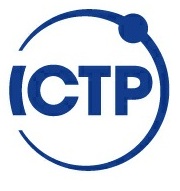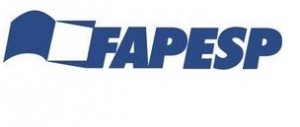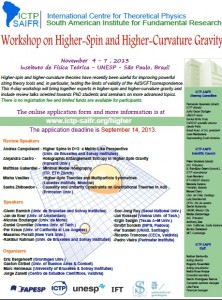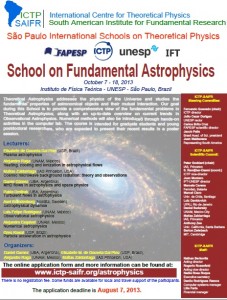Search Results
Experimental high-energy physics
The São Paulo Research and Analysis Center (SPRACE) was established in 2003 to support the participation in major high energy physics experiments. The group was part of the DZero Collaboration from Fermilab since 1999 and became member of the CERN CMS experiment in 2004. The main contribution of the SPRACE group to these collaborations has been on the processing and analysis of the data collected by the experiments. We have been exploring two important branches of fundamental science: the search for new phenomena beyond the Standard Model and the physics of quark-gluon plasma produced in heavy-ion collisions.
The SPRACE group includes:
Sérgio F. Novaes (IFT-UNESP)
Sandra S. Padula (IFT-UNESP)
Sunil M. Dogra (IFT-UNESP)
Eduardo de M. Gregores (UFABC)
Pedro G. Mercadante (UFABC)
The SPRACE group has been operating a Tier-2 class site (BR-SP-SPRACE) of the Worldwide LHC Computing Grid (WLCG) together with the United States Tier-2’s from Caltech, Florida, MIT, Nebraska, Purdue, UCSD, Vanderbilt, and Wisconsin. BR-SP-SPRACE is the only official Tier-2 in Latin America and its operation has been a remarkable success. The expertise acquired by the group with the implementation of the SPRACE Cluster generated an important spin-off: the deployment of the first Campus Grid in Latin America – GridUNESP – that operates in close association with the US Open Science Grid (OSG) infrastructure.
The SPRACE group intends to maintain its successful role in the investigation of physical phenomena through the analysis of the data produced by the LHC, with the essential support provided by prominent theoretical physicists of different institutions.
Continue Reading | Comments Off on Experimental high-energy physics
Mathematical physics
In the field of Mathematical Physics, permanent researchers include:
Jose Francisco Gomes (IFT-UNESP)
whose current research topics involve:
Algebraic aspects of Integrable Hierarchies, Vertex operators and classical soliton solutions, Integrability of models with defects of Backlund type, type I and type II Backlund transformations.
Continue Reading | Comments Off on Mathematical physics
Gravitational wave physics
In the field of Gravitational Waves there is a new active group at ICTP-SAIFR. Presently the researchers in this field include
Gravitational wave research has a high phenomenological impact as the large Gravitational Wave detectors LIGO and Virgo have been operating since 2010 at unprecedented sensitivity, and further increases of sensitivity are scheduled for their advanced runs due to start respectively in April 2015 and 2016.
Reasonable astrophysical estimates make plausible the detection of signals from coalescing binaries in the advanced detector era. Coalescing binaries represent one of the most promising sources for a first direct detection of gravitational waves, and their repeated detections could yield new information on both fundamental gravity and cosmology. To enable such first detection and to maximize the scientific exploitation of the data, it is crucial to develop a more accurate analytical knowledge of the 2-body problem in General Relativity and to develop data analysis methods specifically tuned to the experimental situation.
Applications are invited at any time for a two-year post-doctoral position (with possible renewal for a third year) in gravitational wave physics. The ICTP-SAIFR encourages applications from candidates interested in working on data analysis for gravitational wave detection, with particular emphasis on any of the following topics
- data analysis for gravitational signals from coalescing binaries
- theoretical modeling of the 2-body motion in gravity theories
- analytical modelling of gravitational waves from coalescing binaries
A PhD in Physics at the time the appointment begins is required. The annual salary (tax-free) is 70,800 reais with an additional 9,600 reais for travel and research expenses. Moving expenses to Brasil are also included. Candidates should fill the online application form for a postdoctoral postion at www.ictp-saifr.org and select the subarea “Gravitational Wave Physics” in Step 4 of the postdoctoral application form. The position is still open and can begin anytime after the candidate has been chosen.
Continue Reading | Comments Off on Gravitational wave physics
String theory
In the field of string theory, there are active groups both at IFT-UNESP and USP Sao Paulo and informal seminars are organized weekly at both institutions.
Permanent researchers include
Nathan Berkovits (IFT-UNESP)
Andrei Mikhailov (IFT-UNESP)
Horatiu Nastase (IFT-UNESP)
Victor Rivelles (USP Sao Paulo)
Diego Trancanelli (USP Sao Paulo)
Current research topics include covariant quantization of the superstring, the pure spinor formalism, AdS-CFT, integrability, higher-spin theories, AdS-CMT, noncommutative geometry, twistors, matrix models, super-Yang-Mills, and supergravity.
Continue Reading | Comments Off on String theory
Research Areas
Research at the ICTP-SAIFR includes collaborations with scientists based at IFT-UNESP as well as at other São Paulo institutions such as USP São Paulo, Unicamp, UFABC, UNESP Rio Claro, UNESP Guaratinguetá, USP São Carlos, UFSCar, ITA and INPE.
Current active research areas include:
Atomic and few-body physics
Complex systems
Condensed matter theory
Cosmology
Experimental high-energy physics
General relativity
Gravitational wave physics
Mathematical physics
Particle physics
QCD and hadronic physics
String theory
Continue Reading | Comments Off on Research Areas
Joseph Minahan minicourse on integrability
Minicourse:
Integrability in N=4 super-Yang-Mills
Speaker:
Joseph Minahan (Uppsala University and MIT)
Schedule:
Monday, September 3, 14:00-16:00, Lecture 1 (video 1, video 2)
Tuesday, September 4, 9:00-11:00, Lecture 2 (video 1, video 2)
Tuesday, September 4, 12:00-14:00, Lecture 3 (video 1, video 2)
Continue Reading | Comments Off on Joseph Minahan minicourse on integrability
History
The SILAFAE (Simposio Latinoamericano de Física de Altas Energías) is now firmly established as being one of the premier series of international meetings in the field of Particle Physics. One of the main purposes of the Meeting is to foster the exchange of ideas, promote collaborations and exchanges among Latin-american physicists as well as to present the status of the recent advances in frontier topics in the field.
The previous SILAFAE meetings were held in Valparaiso, Chile (2010); Bariloche, Argentina (2009); Merida, Mexico (1996); San Juan de Puerto Rico (1998), Cartagena, Colombia (2000); Aguas de Lindoia, Brazil (2002); Lima, Peru (2004); Puerto Vallarta, Mexico (2006).
Chile: http://www.fis.utfsm.cl/silafae2010/
Argentina: http://particulas.cnea.gov.ar/workshops/silafae/
Colombia: http://www.lnf.infn.it/conference/lnfss/Silafae-III/
Continue Reading | Comments Off on History
Hotel Recommendations
Paulista Wall Street
Rua Itapeva, 636 – 01332-000 São Paulo
Rates: R$ 253 + 5% (single) or R$ 283 + 5% (double)
They have made the above rate special for an event organized by UNESP. In order to get this rate you have to make your reservation by calling to +55 (11) 3141-3000, extension number 8422, and you have to mention that you will participate in an event organized by UNESP.
Holiday Inn Express
Rua Doutor Homem De Melo, 1206, Perdizes – 05007-002 SÃO PAULO BRAZIL
Rate: R$220,00 + 5% per room (single), or R$260,00+5% (double)
They have made the above rate special for an event organized by UNESP.
In order to get this rate you have to make your reservation before September 14, by calling to +55 (11) 3674-7777 or send an email to recepcao@holidayexsp.com.br. You have to mention that you will participate in an event organized by UNESP.
Formule 1 Paulista
Rua da Consolação 2303 – Consolação – 01301100 SÃO PAULO BRAZIL
Rate: R$170,00 per room (single, double or triple)
Good rate, very well located and close to many amenities.
Click here to make your reservation. In case you do not get availability, please send an email to secretary@ictp-saifr.org .
After you have made your reservation, please send an email to secretary@ictp-saifr.org, informing the hotel where you will stay.
Continue Reading | Comments Off on Hotel Recommendations
Workshop on Higher-Spin and Higher-Curvature Gravity
Start time: November 4
Ends on: November 7
Venue: São Paulo, Brazil
Organizers:
Eric Bergshoeff (Groningen Univ.) e-mail: e.a.bergshoeff@rug.nl
Gaston Giribet (Univ. of Buenos Aires & Conicet) e-mail: Gaston@df.uba.ar
Marc Henneaux (University of Bruxelles & Solvay Institutes) e-mail: henneaux@ulb.ac.be
Jorge Zanelli (Centro de Estudios Científicos, Valdivia) e-mail: z@cecs.cl
Review Speakers:
Andrea Campoleoni (Univ. de Bruxelles and Solvay Institutes), “Higher spins in D=3: a metric-like perspective”
Alejandra Castro (Harvard Univ.), “Holographic entanglement entropy in higher spin gravity”
Matthias Gaberdiel (ITP, ETH Zürich), “Minimal model holography”
Misha Vasiliev (Lebedev Institute, Moscow), “Higher spin theories and multiparticle symmetries”
Sasha Zhiboedov (Princeton Univ.), “Causality and unitarity constraints on gravitational theories in AdS”
Confirmed Speakers:
Max Banados (Univ. Catolica, Santiago), “Building black holes with higher spin”
Glenn Barnich (Univ. de Bruxelles and Solvay Institutes), “Holographic current algebras and BMS4”
Nicolas Boulanger (Univ. de Mons), “A higher-spin Chern-Simons model with fractional-spin fields”
Daniel Grumiller (Vienna Univ. of Tech.), “Holography and phase transition of flat space”
Juan Jottar (Univ. of Amsterdam), “Entanglement entropy in three-dimensional higher spin theories”
Carlos Mafra (Cambridge Univ.), “The superstring 3-loop amplitude”
Massimo Porrati (New York Univ.), “On a canonical quantization of pure AdS_3 gravity”
Rakibur Rahman (Univ. de Bruxelles and Solvay Institutes), “Gravitational Interactions of Higher-Spin Fermions”
Soo-Jong Rey (Seoul National Univ.), “Tensionless String in N*=2 SUSY Gauge Theory”
Jan Rosseel (Vienna Univ. of Tech.), “Three-dimensional flat space higher-spin theory”
Ergin Sezgin (Texas A+M Univ.), “Critical Prokushkin-Vasiliev Theory and Topologically Massive Higher Spins”
Dmitri Sorokin (INFN, Padova), “Higher Spins in Hyperspace”
Per Sundell (UNAB, Santiago), “Vasiliev’s equations, deformed oscillators and topological open strings”
Massimo Taronna (MPI, Potsdam), “Cubic-Interaction-Induced deformations of higher-spin symmetries”
Ricardo Troncoso (CECs, Valdivia), “Higher spin gravity in 3D: Asymptotic structure, black holes and thermodynamics”
Pedro Vieira (Perimeter Institute), “Tailoring Spin Operators and Integrability”
Announcement
-
Photos of School
-
Videos of School
School Program
November 4 |
November 5 |
||
| 10.30 – 11.30 | Coffee + Registration | 10.30 – 12.00 | Alejandra Castro |
| 11.30 – 13.00 | Misha Vasiliev | 12.00 – 12.30 | Coffee Break |
| 13.00 – 15.30 | Lunch Break | 12.30 – 13.00 | Massimo Porrati |
| 15.30 – 16.00 | Glenn Barnich [File] | 13.00 – 15.30 | Lunch Break |
| 16.00 – 16.30 | Daniel Grumiller | 15.30 – 17.00 | Sasha Zhiboedov |
| 16.30 – 17.00 | Coffee Break | 17.00 – 17.30 | Coffee Break |
| 17.00 – 17.30 | Nicolas Boulanger | 17.30 – 18.00 | Rakibur Rahman |
| 17.30 – 18.00 | Juan Jottar | 18.00 – 18.30 | Dimitri Sorokin [File] |
November 6 |
November 7 |
||
| 10.30 – 12.00 | Matthias Gaberdiel | 10.30 – 12.00 | Andrea Campoleoni |
| 12.00 – 14.00 | Lunch Break | 12.00 – 12.30 | Coffee Break |
| 14.00 – 15.00 | Colloquium | 12.30 – 13.00 | Max Banados |
| 15.00 – 15.30 | Coffee Break | 13.00 – 14.30 | Lunch Break |
| 15.30 – 16.00 | Jan Rosseel | 14.30 – 15.00 | Ricardo Troncoso |
| 16.00 – 16.30 | Ergin Sezgin | 15.00 – 15.30 | Carlos Mafra |
| 16.30 – 17.00 | Coffee Break | 15.30 – 16.00 | Massimo Taronna |
| 17.00 – 17.30 | Per Sundell [File] | 16.00 – 16.30 | Farewell Coffee |
| 17.30 – 18.00 | Pedro Vieira | ||
| 18.00 – 18.30 | Soo-Jong Rey | ||
| 19.30 | Conference dinner | ||
Continue Reading | Comments Off on Workshop on Higher-Spin and Higher-Curvature Gravity
School on Fundamental Astrophysics
 |
 |
 |
Theoretical Astrophysics addresses the physics of the Universe and studies the fundamental properties of astronomical objects and their mutual interaction. Our goal during this School is to provide a comprehensive view of the fundamental problems in Theoretical Astrophysics, along with an up-to-date overview on current trends on Observational Astrophysics. Numerical methods will also be introduced through hands-on activities in the computer lab. The course is intended for graduate students and young postdoctoral researchers, who are expected to present their recent results in a poster session.
Start time: October 7
Ends on: October 18
Venue: São Paulo, Brazil
Organizers: Daniel Gomez (UBA, Argentina), Elisabete M. de Gouveia Dal Pino (USP, Brasil), Alejandro Raga (UNAM, Mexico), Matias Zaldarriaga (IAS Princeton, USA)
Lecturers:
Elisabete de Gouveia Dal Pino (USP, Brazil) – Plasma astrophysics
Alejandro Raga (UNAM, México) – Heating, cooling and ionization in astrophysical flows
Matías Zaldarriaga (IAS Princeton, USA) – Cosmic microwave background radiation: theory and observations
Daniel Gómez (UBA, Argentina) – MHD flows in astrophysics and space physics
Pablo Dmitruk (UBA, Argentina) – Turbulent flows in astrophysics
Axel Brandenburg (Nordita, Sweden) – Astrophysical dynamos
Luis Felipe Rodriguez (UNAM, México) – Observational astrophysics
Alejandro Esquivel (UNAM, México) – Numerical astrophysics
Grzegorz Kowal (USP, Brazil) – Particle acceleration in astrophysics
Application Deadline, August 7
List of Participants: Updated on Oct 3
General Information: General Information Sheet
Poster Presentation: Participants who are presenting poster MUST BRING THE POSTER PRINTED. The poster size should be at most 1m x 1m.
Accommodation: Most participants whose accommodation has been arranged and paid by the institute will stay at Pousada Zilah. Each participant whose accommodation has been arranged by the institute has received the details about the accommodation individually.
Registration: We ask ALL PARTICIPANTS to arrive at IFT-UNESP (Rua Dr. Bento Teobaldo Ferraz, 271 Bloco 2 4th floor, in front of Terminal Barra-Funda) on Oct 7 between 8:00 am –9:00 am in order to complete the registration form and to collect the school material. You can find arrival instructions at http://www.ictp-saifr.org/?page_id=195.
Upon registration, participants who are receiving financial support, please bring a photocopy of your ID or passport.
BOARDING PASS – All participants, whose travel has been provided or will be reimbursed by the institute, should bring the boarding pass upon registration, and collect an envelope to send the return boarding pass to the institute.
Emergency number: 982 338 671 (from São Paulo city); +55 11 982 338 671 (from abroad), 11 982 338 671 (from outside São Paulo).
Ground transportation instructions:
From Pousada Zilah to the institute
From the airport to Pousada Zilah
Preliminary Programme: Updated on Oct 11
Files
- Raga1
- Rodriguez_1
- Rodriguez_2
- Rodriguez_3
- Rodriguez_4
- Zaldarriaga
- Brandenburg_1
- Brandenburg_2
- Brandenburg_3
- Brandenburg_4
- Dalpino_12
- Dalpino_3
- Dalpino_4
- Dmitruk_1
- Dmitruk_2
- Dmitruk_3
- Dmitruk_4
- Gomez_1
- Gomez_2
- Gomez_3
- Gomez_4
Student evaluations of school:
Photos:
|
First Week: October 7 – 11 |
|
|
Monday, October 7 |
|
|
8:00 – 9:00 |
Registration |
|
9:00 – 10:00 |
Opening |
|
10:00 – 10:30 |
Coffee break |
|
10:30 – 11:30 |
Rodriguez – Highlights in Multiwavelength astronomy [video] |
|
11:30 – 12:30 |
Raga – Heating, Cooling and Acceleration in Astrophysical Flows I [video] |
|
12:30 – 14:30 |
Lunch |
|
14:30 – 17:00 |
Numerics – Esquivel & Kowal |
|
Tuesday, October 8 |
|
|
9:00 – 10:00 |
Rodriguez – An Introduction to Radio Astronomy [video] |
|
10:00 – 10:30 |
Coffee break |
|
10:30 – 11:30 |
Raga – Heating, Cooling and Acceleration in Astrophysical Flows II [video] |
|
11:30 – 12:30 |
Raga – Heating, Cooling and Acceleration in Astrophysical Flows III [video] |
|
12:30 – 14:30 |
Lunch |
|
14:30 – 17:00 |
Numerics – Esquivel & Kowal |
|
|
|
|
Wednesday, October 9 |
|
|
9:00 – 10:00 |
Rodriguez – Disks and Jets in Star Formation [video] |
|
10:00 – 10:30 |
Coffee break |
|
10:30 – 11:30 |
Zaldarriaga – Cosmology I [video] |
|
11:30 – 12:30 |
Zaldarriaga – Cosmology II [video] |
|
12:30 – 14:30 |
Lunch |
|
14:30 – 17:00 |
Numerics – Esquivel & Kowal |
|
|
|
|
Thursday, October 10 |
|
|
9:00 – 10:00 |
Rodriguez – Observing Sgr A*, the Supermassive Black Hole at the centre of our Galaxy [video] |
|
10:00 – 10:30 |
Coffee break |
|
10:30 – 11:30 |
Raga – Heating, Cooling and Acceleration in Astrophysical Flows IV [video] |
|
11:30 – 12:30 |
Zaldarriaga – Cosmology III [video] |
|
12:30 – 14:30 |
Lunch |
|
14:30 – 17:00 |
Numerics – Esquivel & Kowal |
|
|
|
|
Friday, October 11 |
|
|
9:00 – 10:00 |
Zaldarriaga – Cosmology IV [video] |
|
10:00 – 10:30 |
Coffee break |
|
10:30 – 11:30 |
Dal Pino – Plasma Astrophysics I [video] |
|
11:30 – 12:30 |
Gomez – Fundamentals of MHD I [video] |
|
12:30 – 14:30 |
Lunch |
|
14:30 – 17:00 |
Posters |
|
Second Week : October – 14 or 18 |
|
|
Monday, October 14 |
|
|
9:00 – 10:00 |
Brandenburg – Waves, stratification, & helioseismology [video] |
|
10:00 – 10:30 |
Coffee break |
|
10:30 – 11:30 |
Dal Pino – Plasma Astrophysics II [video] |
|
11:30 – 12:30 |
Gomez – Fundamentals of MHD II [video] |
|
12:30 – 14:30 |
Lunch |
|
14:30 – 17:00 |
Discussion |
|
Tuesday, October 15 |
|
|
9:00 – 10:00 |
Brandenburg – Turbulence & computer simulations [video] |
|
10:00 – 10:30 |
Coffee break |
|
10:30 – 11:30 |
Gomez – Fundamentals of MHD III [video] |
|
11:30 – 12:30 |
Dmitruk – MHD turbulence in the solar wind I |
|
12:30 – 14:30 |
Lunch |
|
14:30 – 17:00 |
Discussion |
|
|
|
|
Wednesday, October 16 |
|
|
9:00 – 10:00 |
Dal Pino – Particle Acceleration I [video] |
|
10:00 – 10:30 |
Coffee break |
|
10:30 – 11:30 |
Dal Pino – Particle Acceleration II [video] |
|
11:30 – 12:30 |
Dmitruk – MHD turbulence in the solar wind II |
|
12:30 – 14:00 |
Lunch |
|
14:00 – 15:00 |
Colloquium |
|
15:00 – 17:00 |
Discussion |
|
|
|
|
Thursday, October 17 |
|
|
9:00 – 10:00 |
Brandenburg – Dynamos: helical & non-helical [video] |
|
10:00 – 10:30 |
Coffee break |
|
10:30 – 11:30 |
Gomez – Fundamentals of MHD IV [video] |
|
11:30 – 12:30 |
Dmitruk – MHD turbulence in the solar wind III [video] |
|
12:30 – 14:30 |
Lunch |
|
14:30 – 17:00 |
Discussion |
|
|
|
|
Friday, October 18 |
|
|
9:00 – 10:00 |
Brandenburg – MHD turbulence in stars, discs, & galaxies [video] |
|
10:00 – 10:30 |
Coffee break |
|
10:30 – 11:30 |
Dmitruk – MHD turbulence in the solar wind IV [video] |
|
11:30 – 12:30 |
Closing |
Continue Reading | Comments Off on School on Fundamental Astrophysics

